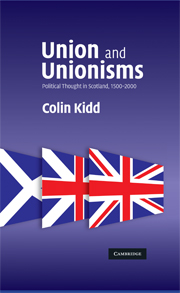Book contents
- Frontmatter
- Contents
- Preface
- 1 Introduction: the problems of Unionism and banal unionism
- 2 Unionisms before Union, 1500–1707
- 3 Analytic unionism and the issue of sovereignty
- 4 Narratives of belonging: the history and ethnology of organic union
- 5 From assimilationist jurisprudence to legal nationalism
- 6 The two kingdoms and the ecclesiology of Union
- 7 Early nationalism as a form of unionism
- 8 Conclusion
- Index
- References
7 - Early nationalism as a form of unionism
Published online by Cambridge University Press: 06 July 2010
- Frontmatter
- Contents
- Preface
- 1 Introduction: the problems of Unionism and banal unionism
- 2 Unionisms before Union, 1500–1707
- 3 Analytic unionism and the issue of sovereignty
- 4 Narratives of belonging: the history and ethnology of organic union
- 5 From assimilationist jurisprudence to legal nationalism
- 6 The two kingdoms and the ecclesiology of Union
- 7 Early nationalism as a form of unionism
- 8 Conclusion
- Index
- References
Summary
Outsiders must sometimes find the nomenclature of British politics confusing. It does seem peculiar that the champions of home rule for Northern Ireland at Stormont have tended to be described as Unionists, while the proponents of a similar measure of devolution for Scotland have generally been known as nationalists. An exception to the normal practice is Alvin Jackson's insightful book Home rule: an Irish history 1800–2000 (2003), which aligns Irish nationalists with their Unionist opponents by way of a narrative which runs smoothly and subversively from nineteenth-century agitation for home rule to its ironic twentieth-century realisation in the Stormont statelet. Jackson's extended study of home rule also illuminates what he describes as ‘a centrist tradition in modern Irish political history – a tradition that has sought to accommodate Irish nationalism with the British state’ and to ‘reconcile’ unionist and nationalist commitments within frameworks of devolved government.
Might there be a similar tale to be told about Scottish home rule? Have Scottish unionists and nationalists always belonged to discrete and impermeable ideological traditions? Did the substantive elements of their respective programmes accurately reflect the antithetical labels which they bore? Or have political labels obscured as much as they have revealed about the core values of supposed unionists and nationalists? This chapter will explore the peculiarities of political labelling. It seems that there may have been a narrower division between the supposed extremes of unionism and nationalism than conventional historiography normally allows and this chapter will identify significant points of contact.
- Type
- Chapter
- Information
- Union and UnionismsPolitical Thought in Scotland, 1500–2000, pp. 257 - 299Publisher: Cambridge University PressPrint publication year: 2008



